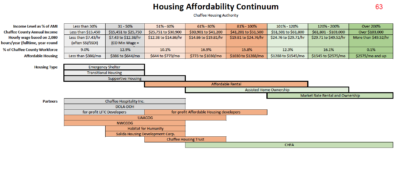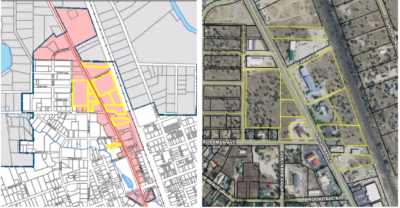Changes to the Unified Development Code (UDC) and Municipal Code and the April 5 election took center stage at the Buena Vista Board of Trustees’ regular meeting on Tuesday, February 8.
The meeting was called to order at 7:03 p.m. after a lengthy work session discussing water policies. The consent agenda was passed unanimously, including the bump in trustee and mayor compensation discussed at the January 25 meeting.
Area Median Income and the Chaffee Housing Authority
Chaffee Housing Authority Director Becky Gray gave a presentation on Area Median Income (AMI) and its impact on rent and development.
Gray explained that the state’s budget for affordable housing this year is around $400 million, which will give them the opportunity to look deeper into the intersections between local policy, private development, and public input into that development.
Gray broke down what she called the “housing continuum,” explaining what the appropriate tools and partners are for the various income levels.

Housing Affordability Continuum. Courtesy of the Board of Trustees, Chaffee Housing Authority.
“It costs the same to build 50 units of market-rate housing as it does to build 50 units of affordable housing,” said Gray. “The costs are fixed. The things that are variable are the rents.”
Developers bring equity to a project, and the rest of the cost is filled by debt. That debt is usually paid off by rents, and lower rent means turning to other resources to bring more equity to a project, like land donations, reduced fees, tax credits, and grants. As Gray explained, “the lower we want to bring the rents, the more we’re going to have to do to fill that ‘gap.’”
Town Administrator Puckett said he still believes there is a level of profit being made locally that could also be a “give” in this situation, and that if a private developer is going to entertain land donations, the town wants to see their numbers. Gray said it was reasonable to ask to see where local contribution ends up in the developers’ pro forma.
Trustee Devin Rowe said he appreciated Gray’s presentation, and that it’s helpful to get folks to afford rent, but that he’d love to see people get to homeownership.
“It’s super hard to get homeownership in this town right now, specifically for service industry folk,” he said. “If we could do things with land or shared equity homeownership to help people with down payments, that would be a great thing.”
UDC and Municipal Code amendments
Planning Director Joseph Teipel reintroduced two proposed changes to the Unified Development Code (UDC) and the Municipal Code.
The first proposed change would exempt small multifamily dwelling projects from a site plan review requirement if the needed water and infrastructure are already in place to support the project, the goal being to eliminate roadblocks to the creation of new housing.
Trustee Norm Nyberg asked about gas and electric lines. Teipel explained that “will-serve letters” from providers are required when developers submit for a building permit and that the town verifies those utilities are able to serve a site.
Trustee Libby Fay motioned to approve the ordinance amending the Municipal Code and Trustee Dave Volpe seconded. The ordinance was approved unanimously.
The second proposed change would create a new residential zone district, R-1.5. Teipel explained that current properties would not be rezoned, but instead, the change would create more middle-ground for future use with lots of five acres or more.
Currently, R-1 is the dominant residential zone district in town, with a minimum lot area of 6,500 square feet. Zone R-2 has a minimum lot size of 5,000 square feet, and zone R-3 requires a minimum of 2,500 to 1,500 square feet. The new R-1.5 zone district would have a minimum lot area of 5,500 square feet. The new zone district would also offer a density bonus in exchange for land dedication matches. The change is intended to establish a new district for greater density and affordable housing as well as support in-fill and neighborhood compatibility.

Courtesy of the Board of Trustees.
Trustee Gina Lucrezi moved to approve the ordinance, and Trustee Nyberg seconded. Trustee Volpe commented on his hesitancy toward the change, citing the information still being gathered regarding the housing study and water.
“I just have concerns for the timing of it,” he said. “I know there are no plans currently for this to be implemented anywhere…I just wonder if our lens is going to be different [in September].”
The motion passed, with Volpe casting the only no-vote.
Teipel and Principal Planner Mark Doering then moved to provide updates on the other two proposed changes, also discussed at the January 25 meeting.
The first discussion topic was a change to allow for Multifamily developments in the Highway Commercial (H-C) zone district. Currently, all multi-family units in the H-C zone district must be part of a vertically integrated mixed-use building. Since January 25, staff has eliminated the fourth story bonus. Projects may be exempted from the mixed-use requirement if they prohibit more than 30 percent of the units being condos, and they can reduce parking if they restrict their availability to 120 percent AMI and below and allow pets.

Highway Commercial Zone District. Courtesy of the Board of Trustees.
One reason Teipel pointed out for this change was that the 2021 CHA community survey found more than 59 percent of respondents reported that the inability to have pets was a primary barrier to finding housing. He also cited a lack of apartment options in town. Doering said they had gotten some public comment and input expressing interest in the changes and the opportunities.
The second proposed change would allow for the creation of a new residential land use called Single Room Occupancy (SRO). Currently, buildings are either non-conforming, are used as Short-Term Rentals (STRs), or are rented out as a whole. Teipel said the change would allow for more flexibility for landlords and tenants to rent to local residents. Since January 25, staff removed the option for STR use for SROs. An SRO building could not have STRs and SRO units in the same building. Teipel also cited seasonal options and increased housing diversity as reasons for the proposed change.
Doering said they would bring input from the Planning Commission to the next meeting. Trustee Fay said she found some of the public comment letters to be “pretty compelling,” as some suggested that if you don’t allow STRs and SRO in one building, you may lose the whole building to short-term rental use.
“I was sold on the idea that we shouldn’t have a mixture of long-term and Airbnb in the same structure, but I found these letters to be pretty compelling,” she said. “If you forbid the Airbnb part…they have to keep it as all Airbnb and you lose the single room occupancy.”
Puckett reminded Fay to be ready to restate those comments in the public hearing at the next meeting. Lacy also asked if Town Attorney Jeff Parker could explain what was meant by non-conforming buildings as they came up.
Trustee Devin Rowe said he wants the board and staff to keep thinking about what the town can do for affordable housing and homeownership.
Trustee Fay reminded the board that the Chaffee County Patriots had invited the trustees to their March 11 meeting. Puckett said they’d have to notice it as a public meeting if more than three trustees attend. Barnett said the League of Women Voters has reached out to do a “Meet the Board” night.
Teipel also added that the condo moratorium that the board put into effect last August would expire on February 24, so staff was putting together options for the board to consider at the next meeting.
Miracle Rink Opportunities
Buena Vista resident Dan Hamme, who joined virtually for public comment, shared that he and the “Miracle Rink group” have found a site that could host both the rink purchased in partnership with the Town of Buena Vista eight years ago, but Salida’s ice rink as well. The building is 73,000 square feet and is just south of Highway 291 near Salida.
“It would be a massive recreation center available to the communities of BV, Salida, Poncha Springs, and Chaffee County,” Hamme explained. “It would be a landmark facility that would draw people from across the nation for high-altitude training, in addition to visiting an amazing facility in an amazing location.”
Hamme wants to maintain an open line of communication with the trustees, as the project has been kept quiet while they’ve pursued the facility. They currently have several options they are investigating and are hoping to close in June or July of this year. They are also exploring adding affordable housing at the facility, which encompasses about 14 acres.
The board adjourned at 9:50 p.m. The next regular meeting will be held at 7:00 p.m. on February 22, 2022, with a work session at 6:00 p.m. to discuss the water rate study. No decisions will be made at the work session. Staff and the public are invited to attend virtually.







Recent Comments